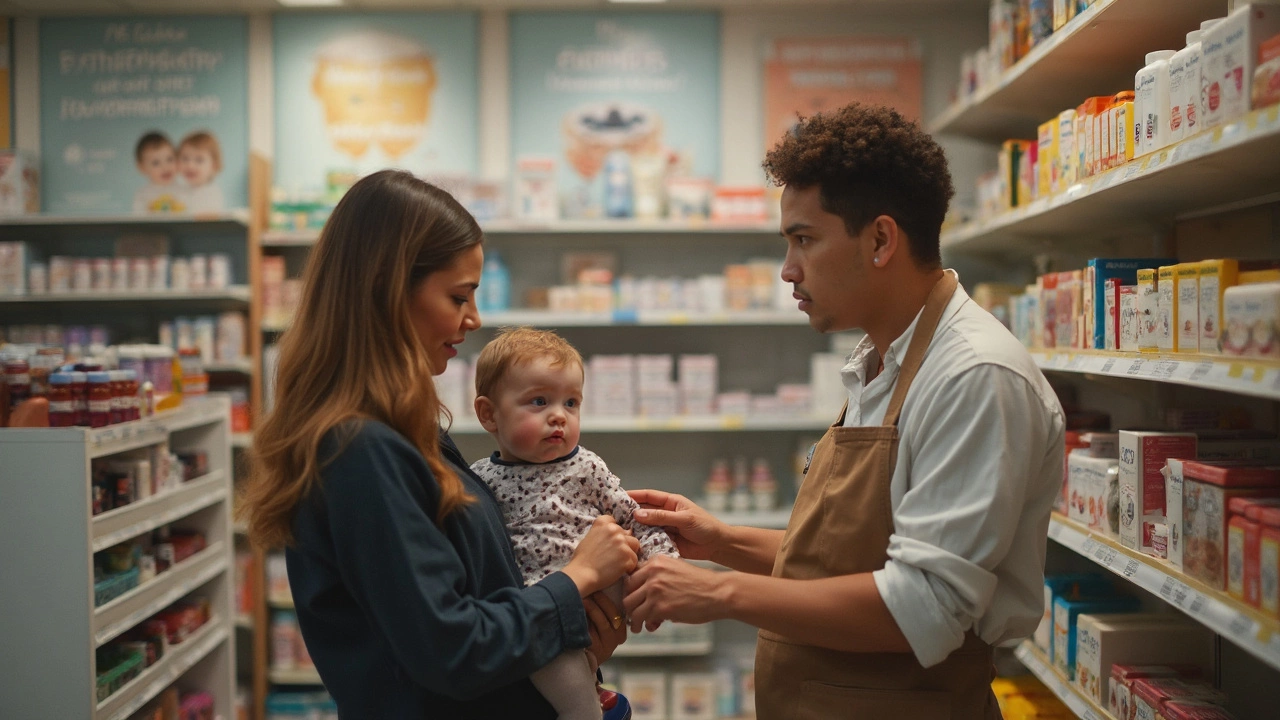Is it Safe to Make Your Own Baby Formula? What Every Parent Should Know

Here’s a question every worried parent asks at least once: If store-bought formula is so expensive, why not just make your own at home? It seems straightforward enough—mix milk, throw in some vitamins, find a recipe online, and voilà. But hang on. Nutrition for babies isn’t something you want to guess at, because one missing vitamin or a wrong step can lead to big health issues fast.
In the last couple of years, especially during formula shortages, parents started swapping tips on homemade recipes shared on blogs and social media. Recipes claiming to be “like grandma used to make” started trending. But unlike homemade applesauce, this isn’t the kind of thing you can safely whip up in your kitchen sink. Even tiny mistakes in the mix can mess with a baby’s developing organs, cause infections, or lead to growth problems. When I first became a mom, I never realized how much science goes into those cans lining the store shelf. Finn had a dairy allergy, so I dove into every ingredient label, thinking about other options. It’s a lot more complicated than just picking the milk that tastes best.
- Why Parents Consider Homemade Formula
- The Science of Infant Nutrition: What Babies Actually Need
- Risks Linked to Homemade Baby Formula
- What Experts (and Real-World Cases) Say
- Safe Alternatives and Tips for Parents
Why Parents Consider Homemade Formula
If you’ve ever stared at empty shelves during a formula shortage, you know the panic that hits. Some parents turn to homemade formula because they just can’t find their regular brand. Others are put off by the long list of ingredients they can’t pronounce on store-bought cans or worry about recalls and contamination. Plus, the cost of baby formula can feel outrageous, especially if your baby needs special types due to allergies or tummy troubles. Add that up and it’s easy to see why people hunt for alternatives.
A big part of the interest comes from wanting more control. Lots of parents believe that making something from scratch must be healthier. Homemade food is usually great, right? And online recipes—sometimes even ones passed down from family—make it seem easy and reliable. Some folks are worried about soy, corn syrup, or added sugars in commercial formulas. Others have heard that babies in the past did fine with evaporated milk and think, why not go back to basics?
- Ingredient control: You know exactly what goes into the bottle.
- Dietary restrictions: Babies with allergies or intolerances sometimes can’t tolerate standard formulas.
- Cost savings: DIY formula can look way cheaper at first glance.
- Convenience during shortages: When shelves are empty, making your own might seem like the only option.
But here’s a reality check—the formulas you see in stores are the result of years of research. They might look simple but they’re matched to what babies need in each scoop. FDA regulations since the 1980s forced companies to get the protein, fat, minerals, and especially infant nutrition right. Homemade versions rarely get even close, which is why swapping recipes on parenting forums can be risky.
| Reason | % of Parents (Approximate) |
|---|---|
| Formula shortage | 37% |
| Ingredient concern | 29% |
| Cost | 22% |
| Allergies/special dietary needs | 12% |
Making homemade formula feels like a hands-on solution when you’re stressed and desperate, but the reasons above don’t always line up with what’s safest for your baby.
The Science of Infant Nutrition: What Babies Actually Need
If you’re wondering why formula is such a big deal, it’s because babies are not just tiny adults. Their bodies are growing like crazy the first year, and they need a very specific mix of nutrients to grow bones, muscles, brains—you name it. It’s not just about getting enough calories.
The big three in infant nutrition are: protein (but not too much), the right mix of fats, and enough carbs. And then there are must-have extras like vitamins (especially D, A, C, E, B-complex) and minerals (iron, calcium, zinc). Missing even one of these, or giving too much, can mess things up for a baby. For example, too little iron? The risk is anemia or even cognitive delays. Too much salt or protein? That can stress fragile little kidneys.
Here’s what commercial baby formula makers have to get right, by law:
- Exact calorie count for proper growth
- Right balance of fat and protein (to mimic breast milk as much as possible)
- Stability—nutrients that don’t break down over time or with heat
- No dangerous bacteria or contaminants
Sometimes you’ll see online recipes with cow’s milk, honey, or homemade supplements. The problem: cow’s milk has way too much protein and minerals, honey can carry botulism, and “eye-balling” vitamins almost always ends up off the mark.
| Nutrient | Breast Milk (per 100ml) | Commercial Formula (per 100ml) |
|---|---|---|
| Calories | 67 kcal | 67 kcal |
| Protein | 1.3 g | 1.3 g |
| Fat | 4.2 g | 3.6-4.5 g |
| Iron | 0.03 mg | 0.5–1 mg |
The bottom line: it’s incredibly tough for a homemade formula to match what’s in that table. Safeguards in store-bought formulas aren’t just for show—they’re there because babies’ bodies are picky and still figuring out how to handle the world.

Risks Linked to Homemade Baby Formula
Trying to make your own baby formula can go sideways quickly because it’s surprisingly easy to get something wrong. For starters, most homemade recipes miss the right amount of essential nutrients—stuff like iron, calcium, and certain vitamins. Babies rely on very specific nutrition to grow their brains and bodies. Even a small gap or extra dose of something can become a big deal fast.
One major risk is the wrong balance of water to nutrients. If it’s too watered down, babies can get a condition called water intoxication, which messes with sodium levels and can cause seizures. If your homemade formula is too concentrated, that can damage little kidneys. This is not just “worst case” talk; hospitals across the US have reported babies getting sick—and even dying—from homemade formula mistakes in the last five years.
- Nutrition gaps: Homemade mixes often lack enough vitamin D, iron, or are too low in healthy fats. Babies can end up with anemia, rickets, or failure to thrive.
- Contamination risks: Your home kitchen isn’t sterile like a formula factory. Milk can carry bacteria (like Salmonella or Cronobacter) that hit babies hard.
- Allergies and intolerance: Thinking goat’s milk, almond milk, or raw milk are safe options? Not for infants. These can cause allergic reactions or tummy problems.
- Wrong recipes on the internet: Social media is packed with risky advice and outdated “natural” formula recipes that skip key ingredients.
Here’s a peek at some recent cases reported in the US:
| Year | Number of Hospitalizations | Main Cause |
|---|---|---|
| 2020 | 18 | Low calcium, bacterial infection |
| 2022 | 27 | Electrolyte imbalance, malnutrition |
| 2023 | 15 | Formula contamination, seizures |
If you’re panicking about store shortages or can’t find a brand your baby can handle, talk to your pediatrician before going the DIY route. The risks with homemade formula have proven real for too many families.
What Experts (and Real-World Cases) Say
The voices on homemade baby formula couldn’t be clearer: pretty much every major health organization, from the American Academy of Pediatrics (AAP) to the FDA, says making your own formula at home is risky and just not worth it. The main reason? Babies have very specific nutrition needs, and even small mistakes can mean not enough protein, calcium, or critical vitamins. These nutrients aren’t just “nice to have”—they’re the building blocks for brain growth and healthy organs.
Back in 2012, doctors noticed a sudden spike in babies hospitalized for seizures and heart problems. Turned out, those parents had tried a popular online homemade baby formula recipe that was missing enough salt and calcium. The babies landed in intensive care. The CDC even put out repeat warnings: if you substitute or dilute infant formula, your child’s life could literally be at risk.
Real-world stats are sobering. In 2022, the FDA ran a review after the formula shortage, and they found that infants fed with DIY formulas often ended up with:
- Malnutrition and poor weight gain
- Low blood calcium (which can cause muscle spasms and heart rhythm problems)
- Bacterial infections from unpasteurized ingredients
Here’s what the experts actually recommend for parents struggling to find safe baby formula or worried about ingredients:
- Stick with commercial formulas when possible—they’re tested and balanced for all the right nutrients.
- If your baby has allergies or medical needs, work with a pediatrician to find special formulas or solutions. Don’t just “wing it” with online swaps.
- Never try to stretch formula by watering it down—this can be even more dangerous than homemade blends.
Ever see a homemade formula recipe that calls for adding honey or using raw milk? Those are huge red flags. Babies can get deadly botulism from honey or dangerous bacteria from raw dairy. There’s a reason you won’t see these in store-bought formulas.
So even when it’s tempting, remember: expert advice is unanimous on this. Homemade formula is a gamble with your baby’s health that you just don’t want to take.

Safe Alternatives and Tips for Parents
If you’re stuck in a pinch or worried about store-bought baby formula safety, don’t panic—there are better options than mixing up a homemade batch. First off, talk to your pediatrician. They’ve seen it all and know about allergy-friendly formulas, special hospital samples, or local programs that help get formula in emergencies.
Some major brands offer hypoallergenic or specialty formulas for babies with allergies or medical needs. These options are strictly regulated, unlike homemade formula, so you know your baby gets what they need. WIC and food banks sometimes stock a range of formulas too, especially during shortages. Call around to local clinics or community centers—they often have tips or extra resources for families who need it.
If you ever have to switch formulas fast, here are a few things you can do safely:
- Stick to FDA-approved powdered, liquid concentrate, or ready-to-feed infant nutrition products.
- Never water formula down to make it last longer—this can mess with salt balance in little bodies and cause seizures.
- Don’t substitute cow’s milk or plant-based milks for under 12 months unless a doctor gives the green light; they just don’t have enough of the right nutrients or calories.
- Double-check expiration dates and storage instructions, especially if you get formula from friends or family.
Sometimes you’ll see people recommending goat’s milk or online “European” brands not approved in the U.S.—these carry their own risks. Shipping issues, fake products, and no safety oversight can put your baby at risk, so check with a healthcare provider before trying anything new.
Moms who can and want to breastfeed sometimes turn to donor milk banks, which screen and pasteurize donor milk for safety. This can be another option, especially for premature or fragile infants.
Here’s a quick look at how common alternatives stack up:
| Alternative | Is It Safe? | Expert Notes |
|---|---|---|
| FDA-Approved Store Formula | Yes | Meets all nutrition safety standards |
| Homemade Formula (DIY) | No | High risk for nutrition gaps and infection |
| Banked Donor Breast Milk | Yes | Safe if screened and pasteurized |
| Raw Cow/Goat Milk | No | Unsafe for infants under 12 months |
| Watered Down Formula | No | Serious risk of health issues |
If finding the right baby formula feels impossible, keep bugging your pediatrician until you’ve got an answer that feels safe. Don’t go it alone here—the risks of homemade formula just aren’t worth it when real alternatives exist. Your baby’s health is way too important for guessing games.

